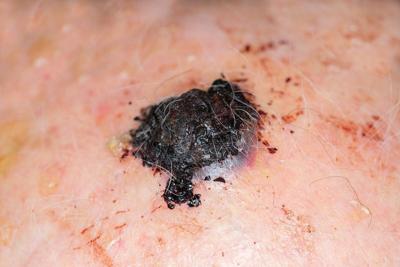Key Takeaways
A genetic test might spare lymph node biopsy surgery among melanoma patients
About 93% of people classified as low risk by the test had no cancer in their lymph nodes
Those folks might be able to skip the biopsy, which requires anesthesia and incisions
MONDAY, Oct. 27, 2025 (HealthDay News) — An already-available genetic test might spare some melanoma patients from a surgical procedure to see whether their cancer has spread to their lymph nodes.
About 93% of people classified as low risk by the genetic test had no cancer in their lymph nodes, researchers recently reported in JAMA Surgery.
These folks — representing more than a third of all cases — might be able to go without lymph node biopsy surgery, which requires anesthesia and incisions, researchers said.
"Surgery will always be central to cancer care, but this study shows that sentinel lymph node surgery might be avoided for selected melanoma patients," lead researcher Dr. Tina Hieken, a surgical oncologist at the Mayo Clinic Comprehensive Cancer Center, said in a news release. "This test lets us use a patient's own tumor biology to guide care with true precision."
Melanoma is the deadliest form of skin cancer, researchers said in background notes. Once melanoma spreads to the lymph nodes, the chances of an extended cancer battle increase.
However, nearly 80% of people who undergo a lymph node biopsy have no cancer in their lymph nodes, researchers said.
To seek a better way of judging the cancer’s spread, researchers reached for a test that measures the activity of eight genes in a melanoma tumor. The genetic test, Merlin CP-GEP, is already available in the United States.
The score from the test, combined with the patient’s age and the thickness of their tumor, was used to estimate the odds that melanoma had spread to the lymph nodes.
To validate the new test, researchers used it to assess nearly 1,800 patients with early or intermediate melanoma at nine U.S. cancer centers between 2021 and 2024.
The test reliably identified melanoma patients with a less than 10% risk of having cancer in their lymph nodes, researchers said. About 37% of the patients tested were considered low risk.
Of the high-risk cases, about 25% did in fact have cancer in their lymph nodes, results showed.
The test’s results could be used to guide decision-making among patients with melanoma, researchers concluded.
“This study represents a major step forward in evaluating personalized melanoma care,” senior researcher Dr. Vernon Sondak, chair of the Cutaneous Oncology Department at Moffitt Cancer Center in Tampa, Florida, said in a news release.
The developer of the genetic test, SkylineDX, funded the study.
More information
Johns Hopkins Medicine has more on lymph node biopsy.
SOURCES: Mayo Clinic, news release, Oct. 22, 2025; Skyline DX, news release, Oct. 22, 2025; JAMA Surgery, Oct. 22, 2025
What This Means For You
Melanoma patients facing a lymph node biopsy should ask their doctor if genetic testing could help guide their decision.





















(0) comments
Welcome to the discussion.
Log In
Keep it Clean. Please avoid obscene, vulgar, lewd, racist or sexually-oriented language.
PLEASE TURN OFF YOUR CAPS LOCK.
Don't Threaten. Threats of harming another person will not be tolerated.
Be Truthful. Don't knowingly lie about anyone or anything.
Be Nice. No racism, sexism or any sort of -ism that is degrading to another person.
Be Proactive. Use the 'Report' link on each comment to let us know of abusive posts.
Share with Us. We'd love to hear eyewitness accounts, the history behind an article.